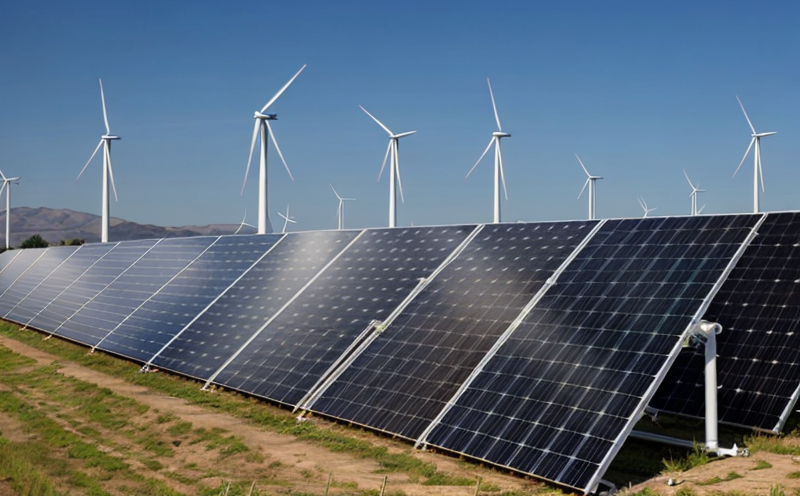EN 50308 Safety Testing of Wind Turbine Systems
The EN 50308 standard is a pivotal document for the safety testing of wind turbine systems, providing comprehensive guidelines and specifications that ensure the reliability and safety of these critical components. This standard covers various aspects including structural integrity, electrical safety, mechanical performance, and environmental resistance. It is essential for quality managers, compliance officers, R&D engineers, and procurement professionals to understand the nuances of this standard as it directly impacts product design, manufacturing processes, and market entry.
The primary focus of EN 50308 lies in ensuring that wind turbine systems comply with stringent safety requirements. This includes evaluating the structural components for fatigue testing, conducting electrical insulation tests, and assessing mechanical performance under various operating conditions. The standard also addresses environmental factors such as temperature variations, humidity levels, and exposure to salt spray, which are crucial considerations given the harsh outdoor environments where these turbines operate.
One of the key aspects of EN 50308 is its emphasis on preventative maintenance and continuous monitoring of wind turbine systems. Regular inspections and testing are critical for identifying potential issues before they escalate into full-blown failures. This proactive approach not only enhances system reliability but also extends the lifespan of turbines, reducing operational costs in the long run.
The standard specifies detailed procedures for conducting safety tests on different components of a wind turbine. These include:
- Structural integrity testing: This involves subjecting structural elements to simulated real-world conditions such as high winds and temperature fluctuations to assess their durability.
- Electrical insulation testing: Ensuring that electrical systems meet the necessary safety standards to prevent short circuits or fires.
- Mechanical performance evaluation: Assessing how well mechanical components function under load, vibration, and other stress factors.
Another important aspect is the requirement for manufacturers to provide detailed documentation of all tests conducted. This includes comprehensive reports outlining test procedures, results, and recommendations for improvement. Such documentation serves as a valuable resource for quality assurance teams and helps in maintaining consistent product quality across batches.
The implementation of EN 50308 ensures that wind turbine systems are not only safe but also efficient and reliable. Compliance with this standard is increasingly becoming mandatory for manufacturers seeking to enter the global renewable energy market. By adhering to these stringent safety protocols, companies can gain a competitive edge by demonstrating their commitment to sustainability and safety.
Moreover, compliance with EN 50308 can lead to enhanced reputation among stakeholders, including customers, regulators, and investors. It also facilitates easier access to international markets where strict safety regulations are enforced. Therefore, it is imperative for businesses operating in the renewable energy sector to prioritize adherence to this standard.
Eurolab Advantages
At Eurolab, we specialize in providing comprehensive testing services that meet the highest international standards, including EN 50308. Our dedicated team of experts ensures that every aspect of your wind turbine system undergoes rigorous evaluation to ensure compliance and safety.
- Expertise: Leveraging our deep-rooted expertise in renewable energy testing, we offer tailored solutions to address the unique challenges faced by this sector.
- Accreditation: Our laboratories are accredited to perform EN 50308 tests according to ISO/IEC 17025 standards, ensuring credibility and reliability of our results.
- Comprehensive Services: We provide a wide range of services from initial design review to final product certification, supporting you throughout the entire lifecycle of your wind turbine systems.
We understand that compliance with EN 50308 is not just about meeting regulatory requirements; it's also about building trust and ensuring longevity. Our commitment to excellence in testing and certification sets us apart as a leading partner for all your renewable energy needs.
International Acceptance and Recognition
The EN 50308 standard has gained widespread acceptance across Europe and beyond, with numerous countries adopting it as part of their national regulations. This global recognition underscores the importance of adhering to these stringent safety protocols when designing and manufacturing wind turbine systems.
- European Union: All member states have incorporated EN 50308 into their national legislation, making compliance a necessity for any manufacturer wishing to sell products within EU countries.
- Brazil: The Brazilian government has implemented regulations requiring wind turbine manufacturers to comply with EN 50308 standards before entering the Brazilian market.
- India: India's Bureau of Indian Standards (BIS) recommends compliance with this standard for all wind turbine systems installed in the country.
The widespread adoption of EN 50308 highlights its relevance and applicability across diverse geographical locations. By adhering to these standards, manufacturers can ensure their products meet the highest safety and reliability benchmarks, paving the way for successful market entry into numerous countries around the world.
Use Cases and Application Examples
The EN 50308 standard finds extensive application in various stages of wind turbine development and deployment. Here are some key use cases:
- Design Validation: Manufacturers use this standard during the design phase to validate that their turbines meet all specified safety requirements.
- Quality Assurance: Regular compliance checks throughout production ensure consistent quality and reliability of the final product.
- Pre-Commissioning Testing: Before installation, turbines undergo thorough testing according to EN 50308 guidelines to identify any potential issues early on.
- Post-Installation Monitoring: Continuous monitoring post-installation helps maintain optimal performance and longevity of the turbine systems.
These use cases underscore the importance of adhering to EN 50308 throughout the entire lifecycle of wind turbine systems. By following these guidelines, manufacturers can ensure their products are not only safe but also meet all necessary regulatory requirements.
For instance, during pre-commissioning testing, we at Eurolab conduct a series of tests including structural integrity checks using finite element analysis software, electrical insulation resistance measurements, and mechanical stress tests. These tests help identify any weaknesses in the design or manufacturing process that could compromise safety and reliability.
Post-installation monitoring involves ongoing inspections and periodic retesting to ensure continued compliance with EN 50308 standards. This proactive approach helps prevent accidents and ensures optimal performance of wind turbine systems, thereby enhancing overall energy production efficiency.





